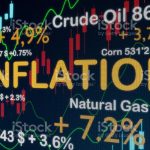Nigeria’s Inflation Surges to 24.08%: A Closer Look at the Economic Climate
Today, we dive into the latest economic developments in Nigeria. In particular, we shed light on the recent spike in inflation, which has reached a staggering 24.08% in July 2023, up from the previous rate of 22.79%. Join us as we explore the implications and factors contributing to this economic climate.
Understanding Nigeria’s Inflation Surge:
Nigeria, like many other countries, experiences fluctuations in its inflation rate. Inflation refers to the general increase in prices of goods and services over time, resulting in the reduction of purchasing power. The recent surge in Nigeria’s inflation rate has raised concerns among economists and policymakers alike, prompting a closer examination of the underlying causes.
Factors Contributing to the Rise:
Several factors have contributed to Nigeria’s soaring inflation. One of the primary drivers is the persistent depreciation of the local currency, the naira, against major foreign currencies. As a result, the cost of imported goods and raw materials has skyrocketed, leading to an overall increase in prices across various sectors.
Furthermore, supply chain disruptions, particularly in the wake of the COVID-19 pandemic, have played a significant role in driving up inflation. These disruptions have created challenges in the production and distribution of goods, further straining the economy and contributing to rising prices.
Implications for the Economy and Citizens:
The high inflation rate has far-reaching implications for both the Nigerian economy and its citizens. Firstly, it erodes the purchasing power of consumers, making it more challenging for individuals and households to afford essential goods and services. As prices continue to rise, the average Nigerian may find it increasingly difficult to meet their basic needs and maintain their standard of living.
Additionally, businesses face the brunt of this inflationary pressure. Rising production costs and increased prices of inputs can squeeze profit margins, potentially leading to downsizing, reduced investment, and economic uncertainty. Furthermore, inflation can hinder foreign investments, as investors may be deterred by the volatile economic climate.
Government Response and Policy Measures:
In response to the escalating inflation, the Nigerian government and central bank have implemented various measures to mitigate its impact. These include tightening monetary policy, such as raising interest rates, to curb excessive spending and reduce money supply. Additionally, efforts have been made to address currency depreciation and enhance local production to reduce dependence on imports.
Nigeria’s recent surge in inflation to 24.08% in July 2023 highlights the challenges facing the country’s economy. The depreciation of the naira, supply chain disruptions, and other contributing factors have led to increased prices and reduced purchasing power for citizens. As the government takes proactive measures to address the situation, it remains crucial for individuals and businesses to adapt and navigate through these challenging economic conditions. Stay tuned to lunagisthub for the latest updates on Nigeria’s economic landscape and other exciting news in the world of entertainment, lifestyle, and beyond.





